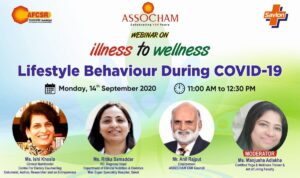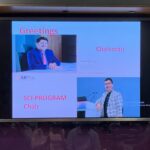Overweight people are 70% more inclined to toning severe COVID-19. Obesity disease needs to be taken seriously owing to the sedentary lifestyles created in the face of COVID-19. Focus should be on getting right food and exercise.


Supported by the hygiene brand SAVLON, the programme which promotes healthy living with focus on wellness and preventive health through healthy habits, diet, exercise, and holistic health saw the speakers discuss at great length the importance of eating right, at the right time and getting enough exercise to aide metabolism. They also discussed at great length the high risk of obesity striking a large part of the population owing to current sedentary lifestyles enforced upon us due to COVID-19.
Shedding light on how diabetes is no longer a cosmetic issue but has seeped much deeper into our lives, Ms. Ritika Samaddar, RD, Regional Head, Department of Clinical Nutrition & Dietetics, Max Super Speciality Hospital, said, “Obesity is the new disease that we need to fight. During this time, we have noticed the people who are obese, are the ones who are getting the severity of the COVID-19. The mortality rate is high only in these people. It is very important for us to understand that no longer can obesity be restricted to a cosmetic problem or something that has to do with your looks but to see it as a medical issue. The severity means they often end up in ventilators from which it is very difficult for them to recover, so it is high time we realise how important it is to be healthy. If you are healthy, your immunity is high so your incidence of any kind of infection would be much less. The public should consider obesity as a disease and take all precautions like dietary, lifestyle or medical management to control it.”
Equating healthy living to better immunity, she focused on the need to exercise regularly as unlocking of the country happens in phases. She added that people need to get back to physical activities like walking, jogging, cycling and running even if gyms continue to remain shut as this is going to be the new normal and will continue to be so for the next few months.
Ms. Ishi Khosla, Clinical Nutritionist, Centre For Dietary Counselling, added to the discussion by saying that obese people have 70% higher chances of contracting viral diseases and suffering from severe symptoms. She also elaborated on emerging lifestyle diseases that are being triggered by COVID-19 like insomnia, adverse eating habits caused due to ungainly work hours and excessive screen time.
Speaking on the importance of having magnesium in diet of people suffering from insomnia, Ms Khosla said, “People who are generally healthy are complaining of not being able to sleep. Anxiety and the fear of uncertainty is there for all. There are 2 slices to tackle it, one is diet and another lifestyle interferences. For diets, take food that digests easily. If digestion is good, body relaxes and emphasis other functions. To pacify nervous system, there are particular vitamins and minerals that are generally ignored. Magnesium is an under-diagnosed deficiency. As a supplement it can do a lot of good work for people with anxiety and sleep disorders. It can play numerous roles like diabetes, sleep management and cholesterol.”
Though, both specialists accepted that people should not recklessly opt for synthetic supplements except they get COVID-19 and are medically prescribed. For healthy people, they suggested opting for natural resources of supplements like herbs, vegetables and fruits. Ms Khosla further added that to battle obesity, focus should be laid on consumption of functional foods and increasing fermented food consumption. For non-vegetarians, she suggested balancing meat consumption with anti-inflammatory diet to keep the digestive and gut system healthy.
Sharing a few quick tips on breaking the sedentary nature of working at home, she emphasized the need to balance screen time and chair time, “No matter what we do, we need to keep moving so there should not be more than an hour of constant siting. This should be followed by 10-15 mins of walking or strolling. We need to take that break to get up and stretch. Sitting can lead to inflammation. Same goes for screen times. There has to be a pause button.”
Mr. Anil Rajput, Chairperson, ASSOCHAM CSR Council, reflected on the importance of balancing our lifestyle with the right food and exercise. “Lifestyle behaviour plays an extremely important role even if we discuss it without the backdrop of the COVID-19 pandemic. Everything in life depends on balance and consistency, therefore, the right balance of regular exercise, be it yoga, running or cycling, eating a nutritious diet, one that provides basic vitamins and minerals and having multivitamins along with mental relaxation can go a long way in warding off many diseases,” he said.
Ms. Manjusha Adlakha, Certified Yoga & Wellness Trainer & Art of Living Faculty moderated the event by placing a variety of issues pertaining to different age groups and lifestyle before the expert panelists and making the programme an extremely knowledge-gaining and insightful one.











